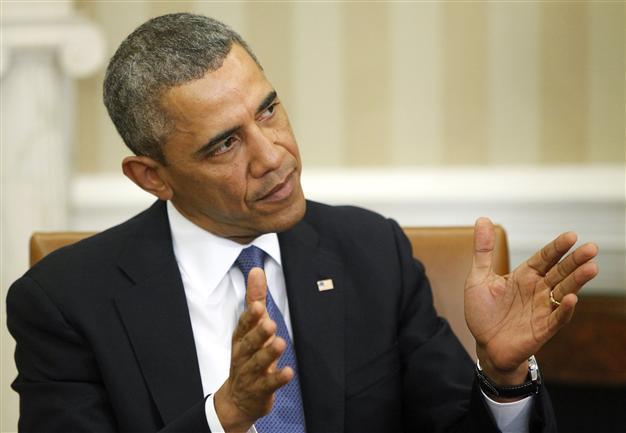Obama says Russia on 'wrong side of history' on Ukraine
KIEV - Agence France-Presse

President Barack Obama comments on the situation in Ukraine before meeting with Israeli PM Benjamin Netanyahu in the White House, March 3. REUTERS Photo
Ukraine accused Russia on March 3 of giving its forces in Crimea an ultimatum to surrender, as U.S. President Barack Obama said Moscow was on the "wrong side of history" in Europe's worst standoff since the Cold War.Both Washington and the European Union said they were looking at a range of sanctions against Russia for its threat to use force against an ex-Soviet neighbour for the first time since a brief 2008 conflict with Georgia.
Russia's Black Sea Fleet however denied it had issued an ultimatum to Ukranian forces and the country's parliament speaker said there was no need yet for Moscow to use its "right" to launch military action in Ukraine.
But world markets plunged and oil prices spiked on fears of an all-out offensive that would pit nuclear-armed Russia against its Western-backed neighbour of 46 million.
Obama used some of his strongest language yet on the escalating crisis on the eastern edge of Europe, where three months of protests culminated in a week of carnage that claimed nearly 100 lives and led to the ouster of pro-Russian president Viktor Yanukovych - now sheltering in Russia.
The U.S. president said the Kremlin had put itself "on the wrong side of history" by mobilising forces in Ukraine's strategic Black Sea peninsula, which has housed the Russian Black Sea Fleet since the 18th century and whose pro-Moscow population looks on the new pro-EU leaders in Kiev with disdain.
"I think the world is largely united in recognising the steps Russia has taken are a violation of Ukranian sovereignty... a violation of international law," Obama said.
He added that he had warned Russia that "if in fact they continue on the current trajectory, that we are examining a whole series of steps - economic, diplomatic - that will isolate Russia."
EU warns of 'consequences'
British Prime Minister David Cameron, German Chancellor Angela Merkel and French President François Hollande on Monday also warned of repercussions for Russia over its "completely unacceptable" actions in Ukraine.
The three leaders, who spoke by phone, agreed there would be "consequences for the Russian government of continuing to violate Ukraine's sovereignty," said a Cameron spokesman.
The West's warnings to Moscow came shortly after Ukrainian defence officials on the flashpoint Crimean peninsula said that Russia had given its forces an ultimatum to surrender or face an all-out assault.
"The ultimatum is to recognise the new Crimean authorities, lay down our weapons and leave, or be ready for an assault," regional Ukrainian defence ministry spokesman Vladyslav Seleznyov told AFP in the Crimean capital Simferopol.
But a spokesman for the fleet based in Crimea told the Interfax news agency the claim was "complete nonsense."
The predominantly ethnic Russian region has come under de facto occupation by Moscow-backed forces who have taken control of government buildings and blocked Ukrainians troops inside their barracks across the peninsula.
"All military bases in Crimea are blocked," regional defence ministry spokesman Stanislav Seleznyov told AFP. "They are surrounded."
Diplomatic frenzy
The tension escalating since last week set off a global diplomatic activity. In New York, the U.N. Security Council held its third round of emergency talks on the crisis in four days, in a meeting called by Russia to set out its position in greater detail.
The Kremlin's envoy to the United Nations told the gathering that it was ousted Yanukovych who had formally asked Moscow to deploy troops in Ukraine.
"People are being persecuted for language and political reasons," Russian ambassador Vitaly Churkin said, quoting from a letter claimed to have been sent by Yanukovych on March 1.
"So in this regard I would call on the president of Russia, Mr. Putin, asking him to use the armed forces of the Russian Federation to establish legitimacy, peace, law and order, stability and defending the people of Ukraine," he read.
Churkin's address provoked stinging rebuke from the British, French and US ambassadors who said Russia was fabricating excuses to justify its violations of international law.
In Brussels, EU foreign policy chief Catherine Ashton said ahead of talks with Russian Foreign Minister Sergei Lavrov in Madrid on March 4 that the 28-nation bloc would "consider targeted measures" against Moscow.
The measures could include suspending long-running talks with the Russian authorities on easing EU visa requirements for the country's citizens, according to an EU statement. A special European summit has been called for March 6.
NATO said it would hold an urgent meeting on March 4 at Poland's request, after the Ukraine neighbour raised concerns about its own security in light of the crisis.
Kiev's new Western-leaning leadership meanwhile was due to receive U.S. Secretary of State John Kerry.
The White House released a statement symbolically signed by the G7 biggest industrialised nations - an economic grouping that unlike the G8 excludes Moscow - promising "strong financial backing" in a programme overseen by the International Monetary Fund.
An IMF team was due to arrive in Kiev on March 4 on a 10-day fact-finding mission to consider the new government's request for $15 billion in assistance this year.
















